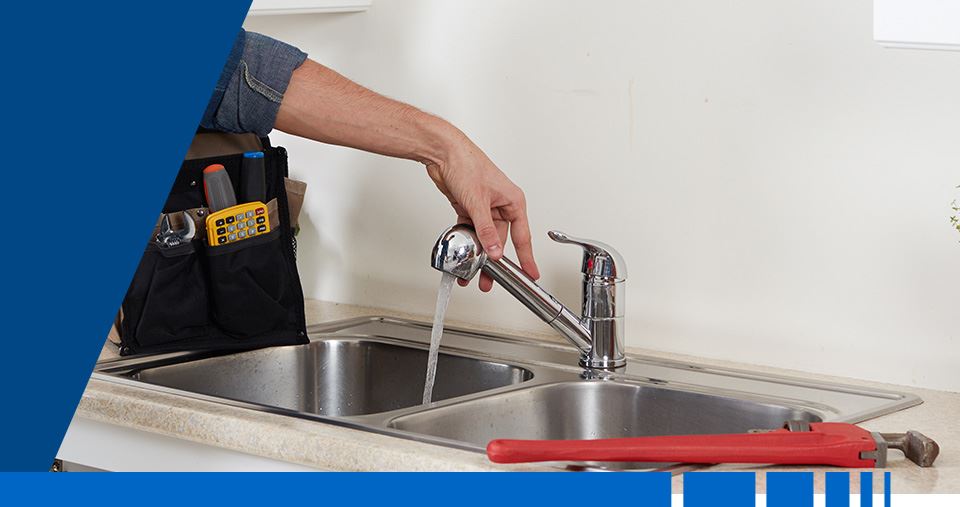
Atlanta Water Treatment Services
Water Quality Experts Serving the Atlanta Metro
Clean water is essential for daily tasks, such as drinking, cooking, and bathing. Factors like high levels of contaminants, hard water caused by excess minerals, or an unpleasant taste and odor can indicate the need for water treatment. Ensuring that your water is free from pollutants and meets safety standards can prevent various health issues, ranging from gastrointestinal problems to skin irritations.
If you have concerns about your home’s water quality, we encourage you to explore our Atlanta water treatment services. Our team of experienced professionals at R.S. Andrews is ready to leverage the latest technologies and industry best practices to diagnose and solve water quality issues effectively. We offer a comprehensive range of solutions tailored to address specific problems, from advanced filtration systems to water-softening devices. Our dedication to customer satisfaction – including our 100% satisfaction guarantee – means we can provide thorough consultations and ongoing support to help keep your home’s water clean and safe.
Not sure if your Atlanta home’s water needs treatment? Schedule an initial consultation by calling (470) 264-8128 or contacting us online today!
Warning Signs of Poor Water Quality
Poor water quality can make itself apparent in various ways. Recognizing the warning signs early on can save you from potential health risks and costly damage to your plumbing system and appliances.
You should consider getting your home’s water professionally tested if you are dealing with any of the following problems:
Unpleasant Taste & Odor
The following unappetizing changes are a strong indicator that further investigation is needed to identify and address the root cause.
- If your water has a metallic, chlorine-like, or otherwise unusual taste, it could indicate the presence of contaminants such as heavy metals, chemicals, or bacteria.
- A strong rotten egg smell often points to hydrogen sulfide, which can stem from decaying organic material in the water.
Frequent Plumbing Issues
Persistent problems with your plumbing, such as clogged drains, reduced water flow, or leaks, can sometimes be traced back to water quality issues. Hard water causes mineral build-up inside pipes, restricting water flow and leading to increased pressure, which can cause leaks or bursts.
Discolored Water
Water that appears cloudy or murky or has a distinct color tint could be compromised.
- Brown or yellow water can indicate the presence of rust or sediment, often arising from corroded pipes or disturbances in the water supply.
- Greenish hues might suggest algae or other organic material, while black water can indicate serious contamination by manganese or sewage.
Any visible change in your water’s color warrants immediate attention, as it could signal harmful pollutants that pose health risks.
Low Water Pressure
A sudden drop in water pressure can sometimes be a symptom of underlying water quality issues. Mineral deposits from hard water can obstruct pipes, reducing the flow of water. Additionally, leaks or breaks in the plumbing system due to corrosive water or invasive roots can cause a decrease in water pressure.
Stains on Fixtures & Laundry
If you start noticing stains on your plumbing fixtures, faucets, sinks, bathtubs, or laundry, it might be a sign of hard water or high iron content.
- Red or brown stains are typically caused by iron
- Blue or green stains can be a result of copper in the water
These stains detract from the aesthetic appeal of your home and can also signal underlying water quality issues that need to be addressed to prevent damage and health concerns.
Dry & Itchy Skin After Bathing
Poor water quality can take a toll on your skin and hair. If you find your skin feeling dry, itchy, or irritated after showering, it could be due to the presence of harsh chemicals, hard water minerals, or microbial contaminants. These substances can strip the skin of its natural oils, leading to discomfort and exacerbating conditions like eczema or dermatitis. Do not wait to request our Atlanta water treatment services if you notice this issue.
Foul-Smelling Drainage
Unpleasant odors coming from your drains can suggest microbial growth or the presence of stagnant water, which can occur if contaminants are clogging the pipes. This affects the overall hygiene of your home and may also indicate that the water supply itself is compromised by organic materials, bacteria, or other pollutants.
Recurring Illnesses
If you or your family members frequently experience gastrointestinal issues, unexplained rashes, or other chronic health problems, it might be linked to water quality. Contaminants like bacteria, viruses, and heavy metals in the water supply can lead to a wide range of health issues if consumed or absorbed over time.
How Can I Improve My Home’s Water Quality?
Our team is prepared to implement solutions that specifically address the contaminants compromising your home’s water quality. After completing testing, we can explain what is causing the problem and walk you through options for fixing it.
Our Atlanta water treatment services include expert assistance with many types of solutions, including:
- Reverse osmosis systems. This advanced filtration method forces water through a semi-permeable membrane, effectively removing a wide range of contaminants, including heavy metals, microorganisms, and chemical pollutants.
- Activated carbon filters. These filters utilize activated carbon's large surface area and porous nature to absorb contaminants, such as chlorine, pesticides, and volatile organic compounds (VOCs). They can be effective in improving the taste and odor of water. Typically installed under the sink or on the countertop, activated carbon filters can be a cost-effective solution for households facing moderate water quality issues.
- Water softeners. Designed to combat hard water, water softeners work by exchanging calcium and magnesium ions with sodium or potassium ions. This ion exchange process prevents scale build-up in pipes and appliances, reduces soap scum, and can alleviate dry skin and hair problems.
- Point-of-use filters. These compact filters are installed directly at the water outlet, such as faucets or showerheads. They are convenient for addressing specific concerns like chlorine removal or sediment filtration in targeted areas. Point-of-use filters are a practical solution for Atlanta households looking to improve water quality in specific locations without investing in whole house solutions.
- Whole house filtration systems. These systems are installed at the point where water enters the home, filtering all water used for drinking, cooking, bathing, and cleaning. Whole house filtration can address multiple contaminants, including chlorine, sediment, and heavy metals, and can be tailored with various filters to meet your household’s specific needs.
Discuss effective solutions for clean drinking and bathing water today by contacting us online or calling our Atlanta water quality experts at (470) 264-8128!

See What Our Satisfied Customers Say
Over 6,800 Positive Reviews On Google!
-
“He said I also needed my filter changed, so he did that. It was so hot and he had to go under my home. He was so cheerful about it. My unit is back to cooling and my home feels wonderful.”- Shelley A.
-
“Petronio the Service Tech that came out to get my AC system cooling again was awesome. he was professional and had an excellent demeanor and I immediately felt very comfortable knowing he was going to shoot straight with me.”- Greg H.
-
“The T & T install team did a fine job as well, and they were really nice young men. We had 2 new high efficiency heat pumps installed: one of which is zoned.”- Danna S.
What Is Harming My Home’s Water Quality?
A variety of factors can negatively impact the quality of water in your Atlanta home, leading to potential health hazards and costly damage to plumbing and appliances. These factors range from natural contaminants to human-made pollutants, each with its own set of challenges and solutions.
Our Atlanta water treatment services include help identifying and addressing many common contaminants, including:
Chemical Contaminants
Chemicals can come from agricultural runoff, industrial processes, and even household cleaning products.
- Pesticides and fertilizers from nearby farms can seep into the groundwater, bringing harmful substances like nitrates into your water supply.
- Industrial discharges often contain heavy metals, such as lead, mercury, and arsenic, which are highly toxic even in small amounts.
- Household chemicals, including detergents and disinfectants, may also introduce hazardous chemicals into the water system.
Consistent exposure to these chemicals can lead to severe health issues, including respiratory problems, skin irritations, and even more severe conditions like cancer or organ damage.
Microbiological Contaminants
Microbial pathogens, such as bacteria, viruses, and protozoa, can pose a significant threat to the safety of your home's water. Water can become contaminated through various means, including inadequate sewage treatment, broken pipelines, and runoff from agricultural areas where livestock waste is present.
Heavy Metals
Heavy metals like lead, copper, and mercury can infiltrate your water supply through decaying pipes, industrial waste, or natural mineral deposits. Lead is particularly concerning because it can leach into drinking water from old plumbing systems, especially in homes built before lead pipes and solder were banned. Chronic exposure to heavy metals can result in a wide range of health consequences, making it crucial to identify and eliminate sources of contamination.
Hard Water Minerals
Hard water contains high levels of calcium and magnesium, which, while not necessarily harmful to health, can severely affect water quality. These minerals can lead to scale build-up in pipes and appliances, reducing efficiency and increasing energy costs. Additionally, hard water can interfere with the effectiveness of soaps and detergents, leaving behind residue on dishes, clothing, and skin.
Pharmaceuticals & Personal Care Products
Medications, shampoos, and other personal care items can find their way into the water supply through various routes, including improper disposal and human excretion. Wastewater treatment plants often lack the capability to fully eliminate these substances, leading to trace amounts entering natural water sources and, consequently, your home’s water supply.
Radon Gas
Naturally occurring radon gas, released from the decay of uranium in soils and rocks, can dissolve into groundwater and contaminate your home's water supply. Radon is a known carcinogen, and while primarily famous for its risks when inhaled, it also poses threats when ingested through water.
Can You Test My Home’s Water Quality?
Protecting the safety and quality of your home's water starts with a comprehensive analysis by trained water treatment professionals in Atlanta. Armed with state-of-the-art testing equipment and extensive knowledge, our team at R.S. Andrews follows a systematic approach to diagnose and address any water quality concerns.
Our process begins with an initial consultation, during which our technicians will discuss any specific water issues you've observed, such as unusual tastes, odors, or stains. This initial discussion helps tailor the testing process to your unique situation.
Our technicians can collect water samples from various points within your home, including taps, showers, and any external sources like wells or cisterns. We can then transport these samples to a laboratory for analysis. Our focus is on identifying a wide range of contaminants, including chemical pollutants, heavy metals such as lead and mercury, and microbial pathogens. Our Atlanta water quality specialists can employ advanced testing methods, such as ion chromatography and mass spectrometry, to detect even trace amounts of these substances.
In addition to the laboratory analysis, our technicians can also perform on-site tests to assess parameters such as pH levels, hardness, and chlorine concentrations. These tests can provide instant insights that can help you make immediate adjustments to your home's water treatment systems. Throughout the testing process, our technicians can explain each recommendation and answer any questions you might have. Our goal is not only to identify and address current water quality issues but also to educate you on how to maintain safe and clean water in the long run.


Here Are A Few Reasons To Smile:
-
Trusted Since 1968Decades of reliable service in your community.
-
Our Unmatched Customer Service
-
Our Money-Saving Tips & Special Offers
-
Our Industry Membership, Accolades, & Licenses